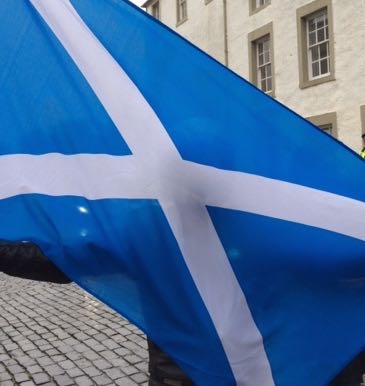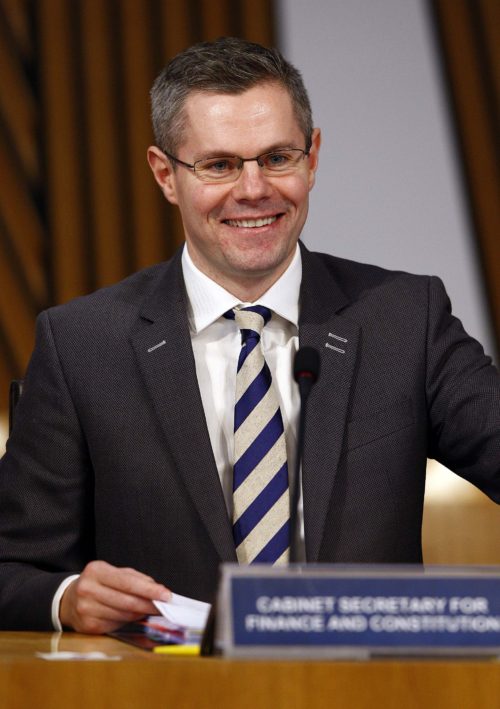Letter from Scotland
This week Scotland passed on the Commonwealth baton to Australia’s Gold Coast. Our flag was first into the arena for the opening ceremony on Wednesday, gracefully carried by hurdler Eilidh Doyle. She was bringing with her the memories and magic of the last Games held in Glasgow four years ago.

But as she did so, a report came out saying that while the Glasgow Games had boosted the Scottish economy by £740m, it had not resulted in the intended legacy of making Scots more active. In fact, those taking regular exercise had fallen from 62 per cent to 53 per cent. In Australia things may be different, though it’s hard to imagine the Australians becoming even fitter and more sports-mad than they already are.
Certainly the weather is different. While the Gold Coast was bathed in its usual warm sunshine, we have had a week of winter weather. A snow storm on Wednesday brought Edinburgh traffic to a halt. Even in the bright sunshine on Thursday, the hills remained covered in snow. The ski resorts are reporting a bumper year. But the farmers are reporting a disaster. New born lambs have been dying at ten times the usual rate.
The agriculture industry is not the only one feeling the cold. The sea food industry is losing another processing plant, Pinney’s in Annan, where 450 workers face losing their jobs. The latest figures show the whole Scottish economy struggling to stay in growth, at 0.8 per cent in 2017, half the rate of the UK.
Then there is continuing “austerity” in the public sector. The local authority Accounts Commission reported this week that a decade of cuts in council funding is resulting in a real risk to the quality of local services. Class sizes in schools have increased. Council care services are failing to cope with the number of patients who should be moved out of hospital beds. Hospital budgets are being stretched to near breaking point. Tayside Health board, for instance, is facing a government inquiry into how it’s been handling its tight budget.

The SNP government says it’s been doing its best to cushion the effects of cuts to its budget imposed by Westminster. The finance secretary Derek Mackay says he has increased the local council funding this year and allowed councils to increase local tax by 3 per cent. Also, from this week, Scottish income tax goes up for all those earning more than £33,000 a year, which Mr Mackay says, will allow him to ease austerity even more next year.
But for the moment, the home news has all been rather grim. With mixed feelings we said farewell to Cardinal Keith O’Brien who has died at the age of 80. He was forced to resign as leader of the Catholic Church in Scotland in 2013 after allegations of sexual impropriety were made against him. We also watched as a senior doctor was jailed for 12 years for possessing firearms, including sub-machine guns, with intent to endanger life. Martin Watt was angry with colleagues after he was sacked from his job as an A&E consultant at Monklands Hospital in Airdrie. You wonder how two talented and dedicated men could fall from grace so easily and so stupidly.
On a more positive note, we learned of two scientific breakthroughs in Scotland this week. More dinosaur footprints have been found on the Isle of Skye. The fossils, on the Trotternish peninsula, were discovered by researchers from Edinburgh University who say they belonged to older cousins of Tyrannosaurus Rex. They were two types of dinosaurs, each standing up to two metres tall, leaving footprints in soft mud between 50cm and 70cm across as they roamed across the Earth 170m years ago.
The other discovery was made as a result of the good ship “Discovery” now on the waterfront in Dundee. Samples of algae brought back by Captain Scott from the Antarctic in 1904 have been found to be a useful “base line” to measure the effects of climate change over the past century. Scientists from the University of Dundee say it’s astonishing the Discovery expedition is still yielding results today.
Looking back like this is certainly useful. But it’s more important to look where you are going, whether that’s in scientific inquiry, local authority budgeting or in the games arena on the Gold Coast.